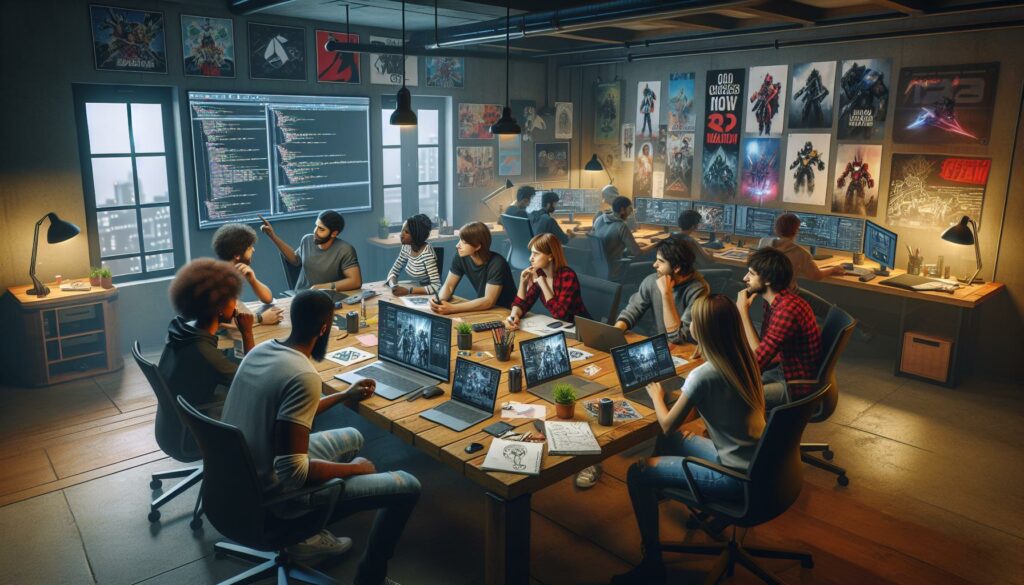As someone who’s spent over a decade in the gaming industry I’ve watched video game development transform into one of the most dynamic career paths in tech. From indie studios to AAA powerhouses the gaming industry continues to grow offering endless opportunities for creative and technical professionals. I’ll tell you right now that breaking into video game development isn’t just about playing games all day. It’s a complex field that combines artistry coding project management and innovation. Whether you’re interested in becoming a game designer programmer artist or producer the industry needs diverse talent to create the immersive experiences players love. Through my experience I’ve learned that understanding the various roles and required skills is crucial for anyone looking to join this exciting field.
- Game development offers diverse career paths including designers, programmers, artists, and sound engineers, with salaries ranging from $45,000 to $200,000+ based on experience and role
- Essential skills combine technical expertise (programming, game engines) with creative abilities (design, art) and soft skills (teamwork, project management)
- Entry requirements typically include a bachelor’s degree in computer science or related field, though specialized bootcamps and certifications provide alternative pathways
- Building a strong portfolio, networking at industry events, and contributing to game development communities are crucial for breaking into the industry
- Career advancement follows structured paths from junior to senior roles, with opportunities in technical, creative, and production leadership tracks
- The industry is rapidly evolving with emerging technologies like XR, cloud gaming, and AI creating new job opportunities and specializations
Video Game Development Jobs
The gaming industry offers diverse career paths that combine technical expertise with creative innovation. Here’s a detailed breakdown of the primary roles in video game development:
Game Designers
Game designers shape the core gameplay mechanics, rules and player experiences. They create detailed design documents outlining game features like character abilities, level progression and combat systems. Top game designers earn $65,000 to $125,000 annually depending on experience and studio size.
Software Engineers
Software engineers build the technical foundation of games through:
- Engine programming for core systems like physics and rendering
- Gameplay programming to implement mechanics and features
- Network programming for multiplayer functionality
- Tools programming to create development solutions
- AI programming for non-player character behaviors
Game Artists and Animators
The visual development team includes specialized roles:
- Concept artists who establish the game’s visual style
- 3D modelers who create characters and environments
- Texture artists who add surface details and materials
- Technical artists who optimize art assets
- Character animators who bring models to life
- VFX artists who create particle effects and visual impacts
- Sound effect creation and implementation
- Musical score composition and integration
- Voice recording and processing
- Audio middleware programming
- Spatial audio design for 3D environments
- Sound mixing and mastering for different platforms
Essential Skills for Game Development Jobs
Game development demands a diverse skill set that combines technical expertise with creative abilities. The following core competencies distinguish successful game developers across various roles in the industry.
Technical Programming Skills
- Master C++ or C# programming languages for engine development gameplay mechanics
- Implement game physics mathematics including vectors matrices collision detection
- Create efficient algorithms for AI pathfinding character behavior procedural generation
- Develop proficiency in game engines like Unity Unreal Engine Godot
- Build knowledge of version control systems including Git Perforce SVN
- Apply optimization techniques for graphics performance memory management load times
Creative Design Abilities
- Create compelling game mechanics that enhance player engagement satisfaction
- Design intuitive user interfaces menus HUD elements
- Develop character narratives world-building story arcs
- Produce 2D/3D art assets textures animations models
- Implement game balance mechanics progression systems rewards
- Structure level designs that guide player flow exploration discovery
- Document technical specifications game design documents production schedules
- Participate in code reviews design critiques team meetings
- Coordinate with cross-functional teams artists designers producers QA
- Present ideas concepts prototypes to stakeholders effectively
- Manage project timelines milestones deliverables
- Incorporate feedback from playtesting user research analytics
Education and Training Requirements
Educational pathways in video game development combine formal academic programs with specialized technical training. The requirements vary based on specific roles within the industry from programming to art design.
Degree Programs
A bachelor’s degree in computer science game development computer engineering or digital arts forms the foundation for most gaming careers. Top game development programs include:
- Computer Science with Game Development concentration at Carnegie Mellon University
- Interactive Entertainment at University of Southern California
- Game Design & Development at Rochester Institute of Technology
- Digital Media Design at University of Pennsylvania
- Game Art & Animation at DigiPen Institute of Technology
Course requirements typically include:
- Programming fundamentals (C++ Java Python)
- Game engine architecture
- 3D modeling & animation
- Game physics & mathematics
- User interface design
- Interactive storytelling
Certifications and Bootcamps
Industry-recognized certifications provide focused skill development in specific areas of game development:
Professional Certifications:
- Unity Certified Developer
- Unreal Engine Certification
- Autodesk Maya Certification
- AWS Game Tech Certification
- Google Play Games Certification
Notable Game Development Bootcamps:
- Game Developer Track at General Assembly (12 weeks)
- Game Programming at Holberton School (9 months)
- Game Design & Development at Playcrafting (8 weeks)
- Full-Stack Game Development at CodeCombat (16 weeks)
- Mobile Game Development at GameDevHQ (24 weeks)
| Program Type | Duration | Average Cost (USD) |
|---|---|---|
| Bachelor’s Degree | 4 years | $120,000 – $200,000 |
| Master’s Degree | 2 years | $40,000 – $100,000 |
| Bootcamp | 3-6 months | $10,000 – $20,000 |
| Certification | 1-3 months | $300 – $2,000 |
Breaking Into the Gaming Industry
Entry into the gaming industry demands a strategic combination of hands-on experience, professional connections, and a strong portfolio of work. Here’s how to position yourself for success in this competitive field.
Building Your Portfolio
A compelling game development portfolio showcases technical skills through completed projects, prototypes, and code samples. I recommend including 3-4 diverse projects that demonstrate proficiency in:
- Playable game demos using industry-standard engines (Unity, Unreal)
- Code repositories on GitHub featuring clean, well-documented implementations
- Technical design documents outlining game mechanics systems
- Visual assets created for games (3D models, animations, UI elements)
- Modified game features or custom tools for existing games
- Game jams or hackathon projects with measurable outcomes
- Attend industry conferences (GDC, PAX, E3) to meet developers face-to-face
- Join online communities on Discord servers focused on game development
- Participate in local IGDA (International Game Developers Association) chapters
- Connect with developers on LinkedIn by sharing relevant content
- Contribute to open-source game projects to collaborate with other developers
- Follow studios’ social media accounts for job openings announcements
- Engage in game development forums like GameDev.net with technical discussions
| Networking Platform | Active Users | Industry Focus |
|---|---|---|
| 875M+ | Professional networking | |
| Discord | 150M+ | Community engagement |
| IGDA | 12,000+ | Industry organization |
| GameDev.net | 500,000+ | Technical discussion |
Career Growth and Advancement
Career progression in video game development follows structured paths from entry-level positions to senior roles with increasing responsibilities and compensation. The gaming industry offers multiple advancement tracks based on specialization expertise and leadership capabilities.
Senior Roles and Leadership Positions
Senior roles in game development encompass technical directors who oversee engine architecture execution earning $130,000-$180,000 annually. Lead game designers guide teams of 5-10 developers in creating core gameplay mechanics while creative directors manage visual direction across multiple projects. Advancement opportunities include:
- Technical Leadership
- Lead Programmer
- Engine Architect
- Technical Director
- Chief Technology Officer
- Creative Leadership
- Art Director
- Creative Director
- Game Design Lead
- Narrative Director
- Production Leadership
- Executive Producer
- Studio Head
- Development Director
- Project Manager
| Position Level | Years Experience | Salary Range |
|---|---|---|
| Junior | 0-3 | $45,000-$65,000 |
| Mid-Level | 3-7 | $65,000-$95,000 |
| Senior | 7-12 | $95,000-$140,000 |
| Lead/Director | 12+ | $140,000-$200,000+ |
Compensation packages include:
- Base salary adjusted by location geographic multipliers
- Performance bonuses ranging from 10-30% annually
- Profit sharing on successful game releases
- Stock options at established studios
- Healthcare benefits coverage percentage based on tenure
- Professional development allowances of $2,000-$5,000 yearly
Each advancement level combines increased technical expertise with expanded team management responsibilities. Leadership roles require managing larger projects budgets ranging from $1-50 million while directing teams of 20-100+ developers.
Work Environment and Culture
The game development industry offers diverse workplace settings characterized by collaborative spaces equipped with high-performance hardware. Modern gaming studios prioritize creative environments that foster innovation while maintaining professional standards.
Studio Life vs Independent Development
Large studios provide structured environments with dedicated departments for art, programming, design, and quality assurance. Teams range from 50-200 members in AAA studios like Ubisoft, Blizzard, and Electronic Arts. Each department operates within established pipelines, using standardized tools and workflows.
Independent development presents a contrasting scenario:
- Remote work flexibility with virtual collaboration tools
- Cross-functional responsibilities across multiple disciplines
- Direct creative control over projects and decisions
- Flexible schedules aligned with project milestones
- Small teams of 2-10 members handling multiple roles
Work-Life Balance
Game development schedules vary based on project phases and delivery deadlines. Standard working hours span 40-45 hours weekly during normal development cycles. Project timelines influence work patterns:
| Development Phase | Weekly Hours | Duration |
|---|---|---|
| Pre-production | 35-40 hours | 3-6 months |
| Production | 40-45 hours | 12-18 months |
| Crunch Time | 50-60 hours | 2-4 weeks |
| Post-launch | 35-40 hours | Ongoing |
- Flexible start times between 8 AM and 10 AM
- Remote work options for specific roles
- Paid time off ranging from 15-25 days annually
- Mental health resources and wellness programs
- Game room facilities for creative breaks
- Professional development time allocations
Current Industry Trends
The video game development industry evolves rapidly with technological advancements and shifting player preferences. These changes create new job opportunities and reshape existing roles in game development.
Emerging Technologies
Extended Reality (XR) development positions have increased 85% since 2021, focusing on VR gaming experiences. The rise of cloud gaming platforms drives demand for network engineers with distributed systems expertise. Key technological advances include:
- Real-time ray tracing integration requires specialized graphics programmers
- Machine learning implementation creates AI developer positions for NPCs behavior
- Blockchain gaming generates roles for smart contract developers
- Cross-platform development expands opportunities for Unity developers
- WebGL programming positions rise for browser-based gaming solutions
Market Demands
Mobile game development leads industry growth with a 23% increase in job postings for 2023. The market shows clear hiring patterns:
| Position Type | YoY Growth | Average Salary Range |
|---|---|---|
| Mobile Dev | 23% | $85K – $130K |
| XR Dev | 85% | $90K – $145K |
| Cloud Gaming | 45% | $95K – $150K |
| AI/ML Gaming | 65% | $100K – $160K |
| Blockchain | 30% | $110K – $170K |
- Live service game specialists for continuous content delivery
- Performance optimization engineers for cross-platform releases
- Monetization specialists with free-to-play expertise
- User acquisition managers with mobile gaming focus
- Data analysts for player behavior insights
I’m confident that a career in video game development offers incredible opportunities for those passionate about creating interactive experiences. The industry’s rapid growth and diverse roles mean there’s space for various talents whether you’re technically inclined or creatively driven.
From my experience watching the industry evolve I can say that success requires dedication continuous learning and adaptability. While the path might seem challenging the rewards of bringing joy to millions of players make it worthwhile.
If you’re considering this career path now’s an excellent time to start. The gaming industry continues to expand and innovate creating new opportunities for aspiring developers every day. Take that first step build your skills and join this exciting creative field.


